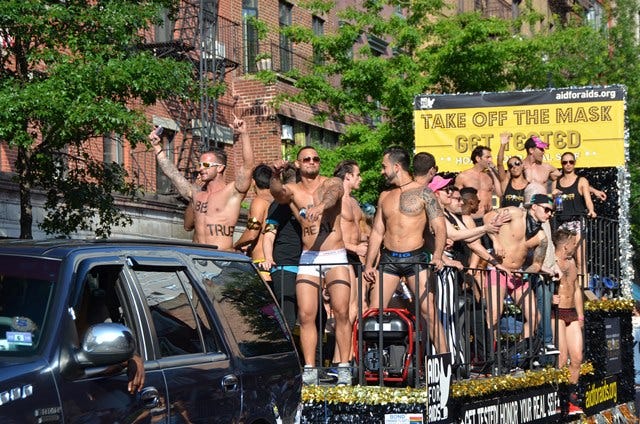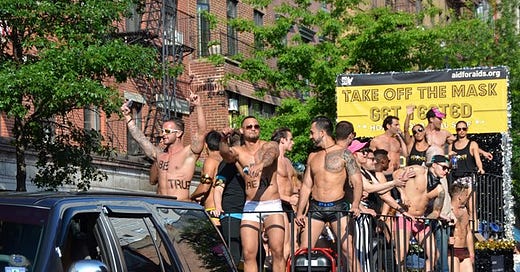What's next? Your goat?
I have never been to a gay pride parade before. I am just not interested. It’s nothing against gays, I would not go to a hooker’s parade either.
Still, this past weekend I ended up by accident in the middle of one.

I didn’t mind it at all. There was lots of genuine exuberance. It was a really gay event. The Bob Dylan fan with us on his first trip to New York just wanted to ‘feel’ Greenwich Village and was a little disappointed as the parade deprived him of the opportunity.
The day before, our New York liberal friend threw another one of her foundational questions at me – this time about gay marriage. The tortured expression on my face while saying ‘it is not that simple’ really got her going.
I must be a homophobe. I must hate gay people. Why else would I try to deny people the rights everybody should have? Why wouldn’t I support their rights to get married?
I found myself yet again in that uncomfortable libertarian corner where I may appear to agree with the moral conservatives while my motives, arguments and reasoning are entirely different.
When the issue is raised, it tends to fall into a simple dichotomy about the sexuality. About our reaction to what most of humanity still consider an unnatural behaviour. If you do not accept it unconditionally, you are a hate filled vile homophobe. Maybe even a Republican or some other sort of right winger. Somehow, the proponents of gay marriage never fail trying to degrade the debate into a discussion about what their opponents think about the (homo) sexual act and about their willingness to tolerate it. Every other argument is dismissed as just an excuse to cover up the real reason: HOMOPHOBIA!!!! The fear of the different. Any opposition, no matter how reasonable is labeled HATE SPEECH, because they consider the benefits to outweigh any conceivable argument against it.
But there are arguments
At another time and another place, a friend, a world renowned scientist but somewhat prudish moral conservative who was also standing opposed to us asked “So what’s next? Marry your goat?” In that case I was arguing for tolerance.
Although the question is usually dismissed as some homophobe nonsense, it is not a bad one.
Boundaries are important, and so is consistency. If ‘A’ then why not ‘B’? Why not polygamy?
Why not incest? Why not pedophilia? Mohammed, the most exemplary of all human beings who ever lived married his favourite wife when she was six years old. Surely the idea of legal recognition of marriage at that age would find support in some segments of society.
The first time I started thinking about the issue I asked how about my brother? What if I want to be my brother’s keeper? What if I want to put him on my dental plan? On the lease of my rent controlled Manhattan apartment? (Seriously, this was an argument of my host for gay marriage; the passing on of a rent controlled lease that only married couples can take advantage of. Denying this fundamental human right from gay couples is clearly inhuman.)
If I say that he is my brother I cannot be his state sanctioned keeper with all the financial and legal perks but if I say that we perform certain sexual act on each other, then I can.
But why to stop with my brother? I cannot even marry my sister! Yes, there is of course this argument about genetic risks and such but why should that keep us from happiness if we truly love each other? What if we promise to practice safe sex? Why is incest a taboo?
I will not get into a discussion about zoophilia, but even that could be argued for. The question is not a joke, it is a question of boundaries, a question about the nature of the institution. If we start expanding the boundaries, we have to start thinking how far are we ready to go? To answer the question, we have to understand what is the point of marriage in the first place.
The rational opposition
It is truly fascinating how much we can talk about marriage without really understanding what it means and how it came about. Why do we have the institution to begin with? It is clearly evolutionary, several animal species have arrangements similar to human nuclear families. If we wish to understand what are the functions of families, and the customs (such as marriage) that keeps them together, we need to look at our evolution and the history of the institution in human societies.
Over the course of the evolution of our species, we figured out a few things:
Biological parents tend to take better care of their off-spring
It is better for those off-springs if their parents stay together through their upbringing.
The existence of the nuclear family is to the benefit of the whole society and should be encouraged with status and respect plus various rewards.
We also recognised that since raising children takes a long time, it is important to have a legal framework that will protect them and the mother. All customs and laws that arose around the institution came about for this reason.
Homosexuals do not produce off-springs, and any group of people where homosexuality grows beyond a certain level will become extinct.
For moral conservatives the institution of the family means the economic and social unit that ensures the continuation of the race and the values of our societies. The nuclear family came about as an evolutionary necessity, not as an evil design to marginalize the …… well, marginal.
For most of history and in most cultures it is primarily a social institution but in the developed world we grew it into something beyond ‘just’ social and turned it into a government enforced legal status bestowing certain privileges on those recognized by it. The institution exists to encourage the things it represents. The institution is about the needs of society and the state, not the individual. Asking for the recognition of a union as marriage while not offering any of its benefits to society is simply selfish and self-indulgent. Gay marriage cannot offer benefits to society; it can only have demands on society and the state.
The libertarian opposition
The libertarian position is simple: marriage is a social, not a political institution; the state should have nothing to do with it. The gays should be able to do whatever they want, call their legal unions, their contracts, ceremonies and commitments whatever they wish as long as they do not expect state sanctioned privileges with it. Not because they shouldn’t have it but because nobody should.
In the state-society-individual trichotomy, the state is in a constant conflict with both society and individuals. The state is most effective when individuals are atomized and the different groups of society are pitted against each other. That is how the state grows. Using its power to take over the functions of civil society in a slow process of ‘divide and conquer’, a process of conferring benefits to one group at the expense of others, strengthening its position as the arbitrator of social morality.
The libertarian position in this instance (as in many similar ones) is a conflicting one. On the one hand we believe that individuals should have the right to do whatever they wish as long as their actions do not directly harm the rights of somebody else, while on the other hand we also believe that the state should not have the right to confer special political and financial privileges on some social groups at the expense of some others. The questions we have to answer is this: should we have equal treatment under a bad law? Should we support a proposition that will make the discrimination, the power and income redistribution even more entrenched?
If gay right activists would fight against the state conferred, discriminatory privileges of marriage, I would be fighting right along with them, but that is not what they want. They just want to be in on those privileges. Once they are in, whoever is left out will be even more marginalized, the hope that we can reform the injustice of the system will be even more remote, the institution will be even more politicized.
The political opposition
Same sex marriage is not about sex, it is about money. Nobody really cares about the sex part any more. The thriving for social acceptance argument is also baloney. Gays do whatever they want for several decades by now without any harassment or discrimination. What they want is money, power and privileges and they are extremely successful getting it. The power they exercise over society far outweighs their numbers and even the level of their affluent status in society.
In a world with constantly declining voter turnouts the support of well-organized and highly motivated voting blocs is a serious asset, a fact not lost on politicians.
Governor Cuomo, who happens to be up for re-election this coming fall, was not only marching in the New York parade, but was also actively (meaning financially) supporting it. The ground was littered with “Thank you Governor Cuomo” and “LGBT for Cuomo” signs. One must wonder how many were printed. How much did it all cost? Who paid for it? I somehow doubt that it came from the Governors’ personal account. It is a safe bet to assume that it came from the public purse.
This is wrong in more ways than I can say and quite likely illegal as well. Does it make me a homophobe if I have a problem with it? A politician using taxpayers’ money to buy the votes of a powerful lobby group for his own re-election? Yet, I find it difficult to imagine that anybody would dare to question Cuomo’s quite possibly illegal use of public money for his personal benefit. It would be political suicide.
Even in Toronto with its conservative Mayor standing quite steadfast against the pressure of the gaystapo, it is unthinkable not to support the parades from public money. Money that may be coming from the pockets of people who may have legitimate reasons to hold a different opinion.
In the end, this is what politics is all about – replacing the voluntary with the coerced in the name of fairness and democracy.
As usual, I am not sure that I was able to give answers, but I hope I was able to raise enough questions to support my position saying that the issue is not that simple. It is important at this point to ask what my actual position would be if I was an elected member of a political body voting on it. My honest answer is that I don’t know. It would depend on the wording and the provisions of the law. I would be more likely to support it than not but I would make serious efforts to voice my reasons to question the wisdom of such law as expressed above.
I do not want to make this post too long, but I have to note that this subject leaves a number of questions open:
The hypocrisy in attacking the quite benign Christian views while giving Islam a pass on far more dangerous attitudes and actions.
The logic behind the state’s war on the family.
The sociobiological reasons behind the gay rights movement’s political push.



